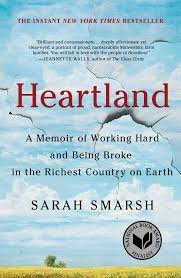Hard Lives and Hardiness in Kansas
Sarah Smarsh is a fifth-generation Kansan who grew up amid grinding poverty. She found a way to get an education and become a journalist. Her first book, Heartland: A Memoir of Working Hard and Being Broke in the Richest Country on Earth is a heartfelt and powerful account of her extended families and community. It is not a rags to riches story. It is not about luck or personal triumph, and it is not a political call for government action or this policy or that policy. Instead, Heartland is an empathetic and critical account of poverty, an up close look at the millions of ways that being poor affects one’s life.

In the trilogy of race, class and gender, Smarsh effectively carves out a perspective that offers a deep understanding of what it means to be poor, white, and a woman in the Midwest. She does it with care and an outstanding eye for detail. (It isn’t what mobile one home one lives in that matters – it is where the mobile home is parked) Readily acknowledging the problems of racism and the difficulties of class identity, Smersh situates herself and her family within larger structures of power and disadvantage. The book’s greatest strength is perhaps in its attention to how women work, work even more, and endure in extraordinarily difficult circumstances with limited options. She makes clear that for her and many of those around here, only one small mistake – a problem that could be readily overcome by someone in the middle class – could effectively derail a person’s life.
Smarsh attributes her education and career to some family stability, to good fortune, and to not becoming a teenage mother, something very common in her family and community. She explores the impacts of domestic violence, the cycle of power exercised by the powerless on those with even less agency. She also calls out the policies and practice that seem aimed at further marginalizing or simply punishing women. Some are known; others are less visible.
For example, women often move regularly out of necessity or fear. Smarsh’s maternal grandmother, Betty, moved constantly. When Betty found a good and reliable match in her seventh husband, Arnie, they were able to keep a farm. The farm, a very modest place, was an anchor, a haven, in Smarsh’s childhood. But like many other family farms that barely make enough, the farm eventually was lost when Arnie died. Just about everyone is working hard, but financial stability is elusive. Rural life in Kansas is tough and unforgiving. Nearby cities, Wichita and Topeka, are not easy, either.
Smarsh mixes government policies and big picture events with local histories. Politics is part of the climate. It is present, it has an impact, and it seems as though it cannot be changed. Smarsh clearly wants to see opportunities and at least some semblance of economic and social justice for many, but that’s not the thrust of her book.
Instead, what is haunting throughout the narrative is the everyday heroism of her kith and kin. Yes, they are flawed and yes, they do not always make the optimal choices. But they often make understandable choices. They are mostly good people and a few are really outstanding – loving, caring and deserving of much more of the good life. They struggle and work hard. Smarsh paints their stories with care and without romanticism. It’s an effective and moving memoir.
Heartland is very easy to read. It’s well written, really beautifully crafted. It is also difficult to digest. The unfairness is raw and uncomfortable, especially in a nation that has so much. If you give Heartland deep consideration, it will haunt you.
David Potash